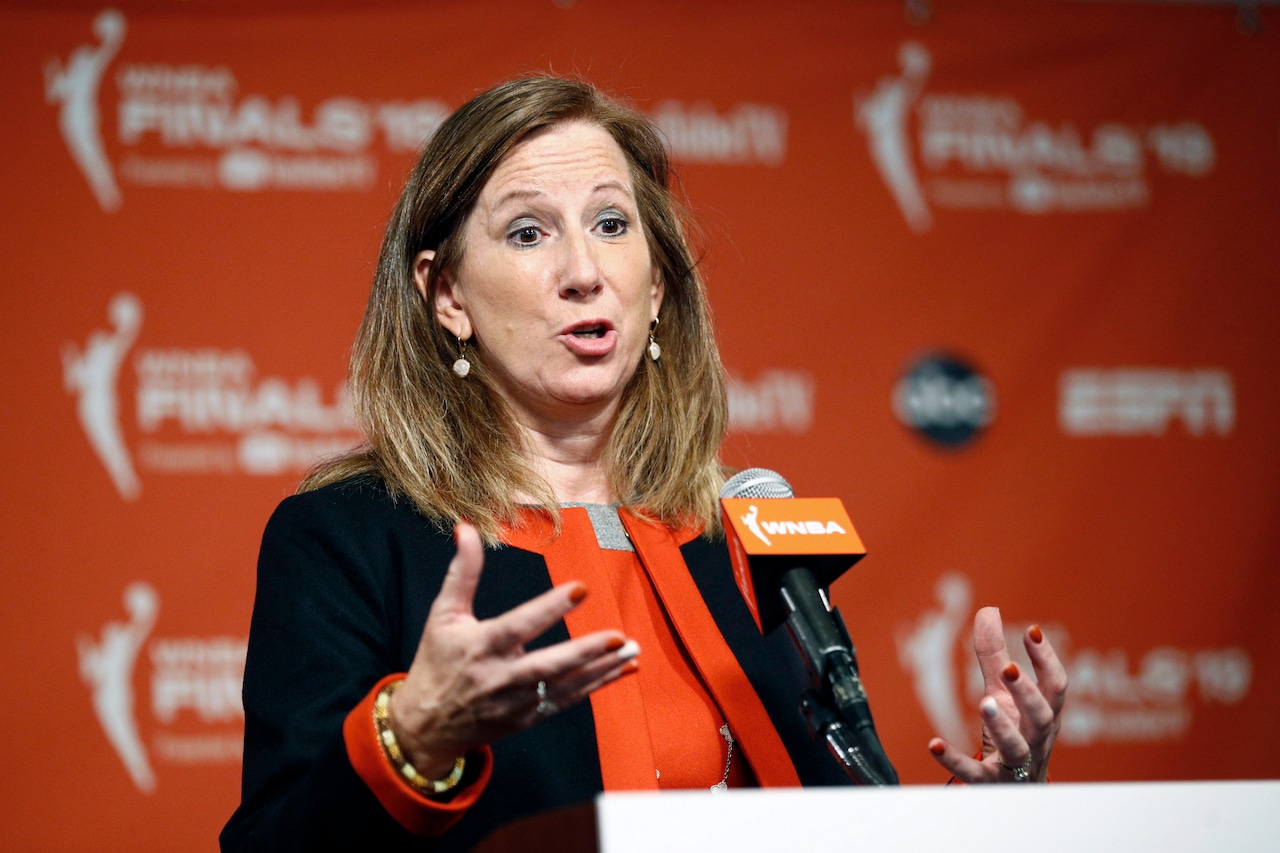Things haven’t been this rigged for Houston to win something since the 2017 World Series. WNBA Commissioner Cathy Engelbert isn’t even hiding the fact that she’s the one banging the trash can lid.
An ESPN report that came out on Tuesday confirmed what was becoming increasingly apparent: The WNBA’s petty leadership doesn’t want the Connecticut Sun to move to Boston and they don’t mind screwing the Mohegan Tribe, which has run the team at a loss, the fans of New England and a prospective owner, who made a record bid.
It all makes the league look small-time. This should be beneath the WNBA.
Boston didn’t participate in the WNBA’s recent expansion process, a process that it would have had exactly zero chance of winning, because there is already a team 90 miles away in Uncasville, Connecticut. Going through the motions would have been a waste of time, money and resources. Especially when it seemed pretty obvious that the Sun would likely be on the move eventually.
Instead, Steve Pagliuca, a well-respected and well-liked former Celtics minority owner, came to an agreement on a $325 million bid to buy and move the team, just up the road to Boston, where he pledged to build a $100 million practice facility.
That should have been cause for celebration. Instead, the league began immediately laying the groundwork to block the deal. WNBA leadership is holding Boston’s lack of a bid during the league’s recent expansion process against it. It’s an argument that doesn’t make sense, but it’s the best they have to keep their rigged train on the track to Houston.
Most leagues, credible ones anyway, encourage their teams to find local buyers. The WNBA has not only thrown up roadblocks for Boston, but Hartford, too.
It would be more understandable if Houston were a terrific up-and-coming market that the league was desperate to get into, but didn’t have expansion coming anytime soon. Like Vegas had been in the MLB or the NFL.
But Houston has been a WNBA embarrassment before. Their failure, like everything else, was bigger in Texas. Houston couldn’t/wouldn’t support the Comets after they’d won four WNBA championships.
Failing in 2008 isn’t the same as failing today would be, but the Comets went belly-up with Hall of Famers, players who were household names before WNBA players were household names. Cynthia Cooper, Sheryl Swoops, Tina Thompson, Dawn Staley and Rebecca Lobo were all part of the dominant Comets, who couldn’t stay afloat and couldn’t find a buyer.
It’s not just the WNBA. Houston is a city that lost its NFL team. In football-mad Texas, the Oilers pulled up roots and went to Tennessee.
The WNBA didn’t even like Houston that much. The league is in a huge expansion period. Beginning with Golden State this year, the league is adding six teams, including three other prior failures, through 2030. If Houston were such a great market, the league could have added it already.
Houston is far from a sure thing. But they participated in the expansion process.
In hindsight, Engelbert’s appearance in Boston when Connecticut hosted Indiana at TD Garden looks incredibly disingenuous. There was ample discussion among media, coaches and even the teams’ players about the possibility of the Sun relocating to Boston.
She ate up all of Governor Maura Healey’s fawning proclamations and didn’t hide from the rumors of Donnie Wahlberg’s interest in buying the team. All the while, the fix was in for Houston. Engelbert probably has a big hat picked out already for the announcement.
The W is choosing to stick it to New England and all of the Sun fans. If the Sun move to Boston, a decent percentage of the team’s supporters are likely to stay aboard. Many already live within a commuter rail ride of TD Garden anyway. Even the Connecticut residents aren’t so far away that they’d never make the trip.
UConn’s success over the past 30 years created women’s basketball fans in New England long before much of the rest of the country caught on. And the many former Husky players, who are thriving in the league, make it likely that fans in that state would retain their allegiance to the Sun in Boston.
But stripping the team out of the region leaves them with nobody to root for. There’s no guarantee that any of those jilted fans would come back to the WNBA in eight years, if Boston gets awarded a team then.
Pagliuca might no longer be interested by then either. The 70-year-old could spend his money elsewhere rather than sit on his hands for eight more years. Right now, he has an ally in the governor’s office, which is critical when relocating to Boston. Healey might not be there by the time expansion rolls around again.
The quality of the play in women’s professional basketball has taken huge steps forward. The players have begun to get the respect they’ve worked so hard for so long to earn.
But a big-time product can’t succeed with small-time leadership. If the WNBA can’t handle expansion and relocation like a first-class league, how are they going to navigate the labor battle that looms just down the road?
If you purchase a product or register for an account through a link on our site, we may receive compensation. By using this site, you consent to our User Agreement and agree that your clicks, interactions, and personal information may be collected, recorded, and/or stored by us and social media and other third-party partners in accordance with our Privacy Policy.

